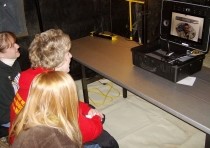

STEVENSVILLE, Md. (January 26, 2008) – Families of Marines in Iraq visited with their loved ones overseas through video teleconference (VTC) at the first annual Marine Buddy Challenge on Saturday, January 16, 2008, at Reedy Creek Park in Charlotte, N.C. Marines in Al-Taqaddum, Iraq, talked to their families in person through a live satellite feed from 7:00 a.m. to 10:00 a.m.The Marine Buddy Challenge, an athletic competition based on the U.S. Marine Corps Physical Fitness Test, took place simultaneously in Charlotte and Iraq with over one hundred participants comprised of two-person teams and “spirit runners.” Four local families had quality face-to-face time, dubbed “freedom calls,” with their Marines through the VTC. Fellow competitors and members of the public also used the telecommunications technology to offer support to both sites prior to the event.Funds raised will benefit the Colonel Richard A. Christie Memorial Fund, which provides college scholarship assistance to former Marines. The event was organized by the Marine Corps Coordinating Council of Greater Charlotte.The Charlotte Fire Department supplied their field communications unit (FC-1) for the Internet Protocol (IP)-based satellite connection between Charlotte and Iraq.“The families were in heaven speaking to their boys,” said Captain Rob Brisley, Public Information Officer for the department. “The opportunity was truly priceless.”FC-1 provides communications support for the department and for areas without coverage or that have been devastated by a natural or manmade disaster. The 2007 Chevrolet Suburban houses a variety of radio, telephone and video conferencing equipment designed to provide interoperable communications during incident response.“It’s our first community service usage,” said Brisley. “It was a great opportunity for us to crank up our equipment, personnel and resources for a nonemergency event.”Deputy Chief Jeff Dulin echoed this sentiment. “This is the kind of thing that makes my job worthwhile – to see this piece of technology used in a way that benefited the military community and their families.”The department acquired the FC-1 in July 2007 through funding from the Charlotte Urban Area Security Initiative (UASI), a Homeland Security program that protects Charlotte and surrounding counties against terrorist threat. FC-1 is based in Charlotte but available to the entire UASI region, which comprises a total of 11 counties and 2.5 million people.“FC-1 adds substantially to the emergency services beyond the city of Charlotte,” said Brisley. “To have this valuable equipment and use it on a regular basis, whether it’s for emergency or outreach, allows us to be more efficient.”PEAKE, based in Stevensville, Md., with a field office in Raleigh, N.C., outfitted FC-1 with a suite of IP-based communications tools combining voice, data, video and radio. The Tandberg VTC system used for the event was one portion of the capability FC-1 provides.The company’s Tactical-IPTM satellite service enables the fire department to maintain communication with other local, state and federal agencies at any incident scene, regardless of location or conditions. The VTC can just as easily link to Iraq, an extreme example of the type of connection this technology provides. Greg Hauser, the communications lead for FC-1, helped set up the satellite connection. “We ran the Ethernet ports from one side and the power outlets from one side. Once the connections were up, we were good to go. The VTC unit was very easy to use,” he said.“It’s a huge accomplishment demonstrating how far public safety communications have advanced,” said Chris Boyd, Vice President and Chief Communications Architect for PEAKE.The VTC calls were placed using “open standards” IP, so there was no red tape. Encrypted for privacy, the calls were placed via IP-based satellite and routed across the Internet to the Freedom Calls Foundation site at Al-Taqaddum, Iraq. Since callers can actually see each other using “telepresence” technology, the VTC creates a more personal communication experience than a traditional phone.“The VTC worked perfectly,” said Brisley. “The link was very sharp for the families and command staff locally and overseas.” “We’re excited that we could help the fire department pull this off,” said Boyd. “I’m really proud that a solution developed for emergencies and disasters could also be used for this type of event. To see the emotion of these families while getting to see their soldiers really made it worthwhile.”PEAKE is a technology solutions provider specializing in the design, development and implementation of IP-based emergency communications. PEAKE provides turnkey solutions in voice, video and data for first responders, disaster recovery and continuity of operations. For more information, visit www.peake.com.If you’d like more information about PEAKE, or to schedule an interview with Chris Boyd, please contact Stephanie Jones at (410) 604-6004, (443) 481-0220 (cell) or sjones@peake.com.Marine Buddy Challenge contact: Aaron Harper, Co-Race Director/VTC Coordinator, (919) 272-4461 or eventxo@carolinamarines.orgCharlotte Fire Department contact: Captain Rob Brisley, Public Information Officer, (704) 336-2094 or rjbrisley@ci.charlotte.nc.usFreedom Calls Foundation contact: John B. Harlow II, Executive Director, (973) 290-7886
Stay Up To Date
Keep up with PEAKE and everything we’re doing.
